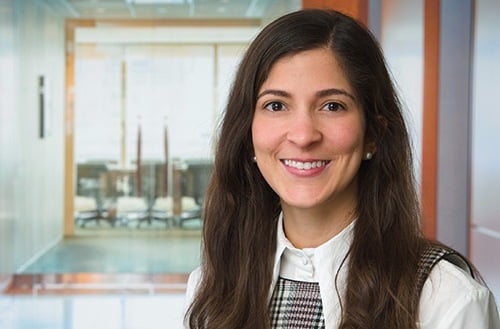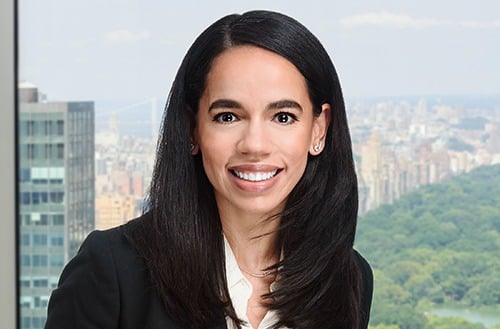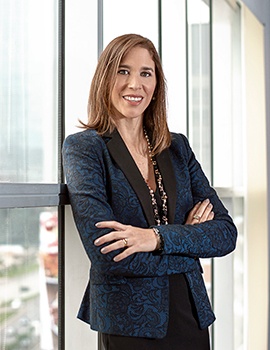I’m going to try to say this as simply as possible: we have more women in the world, and women live longer. We have a group of people living longer without the financial resources to live well. If you consider that women don’t have a way to pursue a profession or financial independence, that economic model is not sustainable.
Of course, I could go to the UN and bring the numbers – ‘We can bring three trillion dollars into the economy if we achieve gender equity.’ But you should think of this in simpler terms: if you want to have people purchasing, living and having financial independence, you need to have everyone in the work environment.
The same arguments apply to people with disabilities, transgender people, LGBTQIA+ people and racially diverse people. We need to have everybody working; we need to have everybody pursuing financial independence. That’s the only way we can have everybody an the same table; everybody with the same resources for housing, health and education. If you take these people out, you’re going to have a huge gap in the future. We need to make it feasible for everybody to be able to work.
Access to education
Today, we have a lot of women in Latin America who are able to get into university to reach the legal profession. However, when you climb the pyramid to pursue higher positions, there is still a gap.
We still have a lot of red and yellow flags regarding children and girls. We have menstrual poverty, we have a lack of education. I think we are doing a good job with established women: we have young lawyers, we have a lot of mentorship, we have done a lot to address the women that are already in the workforce – those who have graduated from law school, graduated from engineering school, for example – and we are organizing a lot to help these women to grow.
But I feel there is a gap in terms of how we are helping all children, all girls, to achieve this step, and to really achieve a high-quality education. In Latin America, you have a lot of women who are able to go to school in the large urban areas. But if you move to the countryside, to the farms, to the less developed cities – oh my god! The girls share their time between housework, family work and also school. They don’t have access to proper places to clean themselves, proper places to study. I think it’s something we need to really think about. We are doing a good job with the women who are able to achieve education but what are we doing for the kids who do not have the same access to education?
Creating the conditions
Rock Content is a Saas Company in digital marketing, and we have this fun start-up environment. There are a lot of young people, and I have to say they have a different view about diversity and inclusion – they see that it is natural.
We have a leader for diversity and inclusion, and we are starting to have a lot of conversations and policies to raise awareness for the company about every aspect of diversity.
We have a lot of allies, to help diverse representatives. One of our goals at this moment is to bring in more people with disabilities.
We have also been thinking a lot about education. We have two main initiatives. One is led by the social impact area of the company, and we give scholarships. The other is that we are about to become a member of ‘Pledge 1%’, an initiative to commit 1% of our equity and employees’ time to educational initiatives.
An incredible journey
Rock Content is a really different environment from much of my career. My click with diversity and inclusion started around 2011 when I first achieved the GC position, and I was the only woman at the table. At that time, I was in the insurance sector, a market where I worked for 12 years, and an environment that, in Brazil, is very masculine and non-diverse.
I said, ‘I don’t want to be the only woman at the table, I don’t want to work in an environment that doesn’t see diversity as part of the strategy.’ So that’s when I started to take some actions and become an advocate for diversity and inclusion. I went to Harvard to attend the Women’s Leadership Forum, and I created a workshop for women in my company. After that, together with two other female GCs in the insurance sector, we created a task force in the Brazilian Insurance Confederation. In 2018, we founded a diversity and inclusion institute for the insurance market in Brazil. So that was the beginning of an incredible journey – we saw a lot of impact from what we started in the market.
Today, if you go to insurance companies in Brazil, all of them have some consideration for, or policy, initiative or target for diversity and inclusion. We see a lot of changes, not only as individual companies, but also as a sector.
Giving opportunities
At Rock Content, I’m a super ally for diversity and inclusion. I’m not only supporting the aspects of it, but also to make it visible, to start to help to drive policies and procedures, to have a diversity and inclusion framework that can also incorporate and embrace the company as a whole. I’ve been working really hard with our leader in diversity and inclusion, and also the head of education and the head of social impact, in order to really make sure that our environment is really inclusive.
One of the initiatives is around people with disabilities, so at this moment we have a lot of lectures and information-sharing regarding that. In September, we had a huge presentation for the whole company to help everyone understand not only the importance of employing people with disabilities, but also how we can embrace this.
We have initiatives like ‘Women Rocks’, ‘Inclusion Matters’. One of the pillars of our business is ‘Rock University’, and we give a lot of lectures, courses and we provide scholarships to low-income families to be able to attend the courses.
Within the legal team, I always pursue people with disabilities, women, and minor representation. I don’t like to say ‘minority’; I like to say ‘minor representation’.
At this moment, I’m hiring, and when they published the vacant position, I asked for somebody with a disability. It’s not only about walking the talk, it’s something that l believe: I need to give opportunity. Our company language is English, it’s our first language globally, even in Brazil. As a legal-compliance department, English is almost crucial. I know that hiring a person within minor representation groups with English knowledge is going to be challenging. But I decided, you know what? Let’s try to find somebody. Even with basic or intermediate English; we are going to develop this individual and provide support to grow as a professional.
A healthy workplace
Motherhood is part of our world, and in every team I have led, I’m always an advocate for parental leave, not only for women but also for men. At Rock Content, it was one of the goals for our CEO and so what we have today is a ‘family’ leave policy. Men and women across the globe have the same amount of leave, so we’re not talking about different policies for men and women. We are talking about four full months for everyone who becomes a mother or father. That’s why we call it family leave. And we give flexible hours too.
Among the other policies that we have established, especially in the current remote-working environment, is ensuring that work breaks will be respected. Lunch hours need to be respected too. No emails at night. These initiatives are crucial for a healthy environment.
In law, our foundational base is human rights – as lawyers, we are trained to observe human rights, and with diversity and inclusion, we are talking about fundamental human rights. It’s the right to have access to employment, to healthcare, education, to have a house. So as lawyers who work in enterprises, we make sure that we are complying with human rights, with labor laws, and make sure that we have equity. As lawyers we really have the tools to make this happen – to create healthy workplaces.
Since speaking to GC, Ana Paula de Almeida Santos has left Rock Content to become general counsel, head of legal and compliance at Argo Insurance in Brazil.








 First, we should make mindful decisions about who we hire and resist the urge to favor people who look like us, went to the same schools as us or grew up in the same towns as us. Then, once you have a diverse legal team, be mindful that everyone’s experiences are different, and just because something has worked well for you, does not mean it will work well for me. Unsolicited commentary about the way one person handled a situation could be received differently than may have been intended so we should be aware of the impact of our words. Allow lawyers to develop their own styles and manage their projects as they see fit as long as the common goal to fulfill a client’s needs is being met.
First, we should make mindful decisions about who we hire and resist the urge to favor people who look like us, went to the same schools as us or grew up in the same towns as us. Then, once you have a diverse legal team, be mindful that everyone’s experiences are different, and just because something has worked well for you, does not mean it will work well for me. Unsolicited commentary about the way one person handled a situation could be received differently than may have been intended so we should be aware of the impact of our words. Allow lawyers to develop their own styles and manage their projects as they see fit as long as the common goal to fulfill a client’s needs is being met.
 When I joined Sodexo 11 years ago, diversity and inclusion was part of the DNA of the company even then, but not in the same way that we work now. Ten years ago, these topics weren’t part of the board of directors or the leaders of the company. Nowadays, I think it’s not acceptable if a company doesn’t take the time to discuss these topics at board level. It’s not about one specific sector or business – the market in Peru needs to talk about diversity and inclusion.
When I joined Sodexo 11 years ago, diversity and inclusion was part of the DNA of the company even then, but not in the same way that we work now. Ten years ago, these topics weren’t part of the board of directors or the leaders of the company. Nowadays, I think it’s not acceptable if a company doesn’t take the time to discuss these topics at board level. It’s not about one specific sector or business – the market in Peru needs to talk about diversity and inclusion.